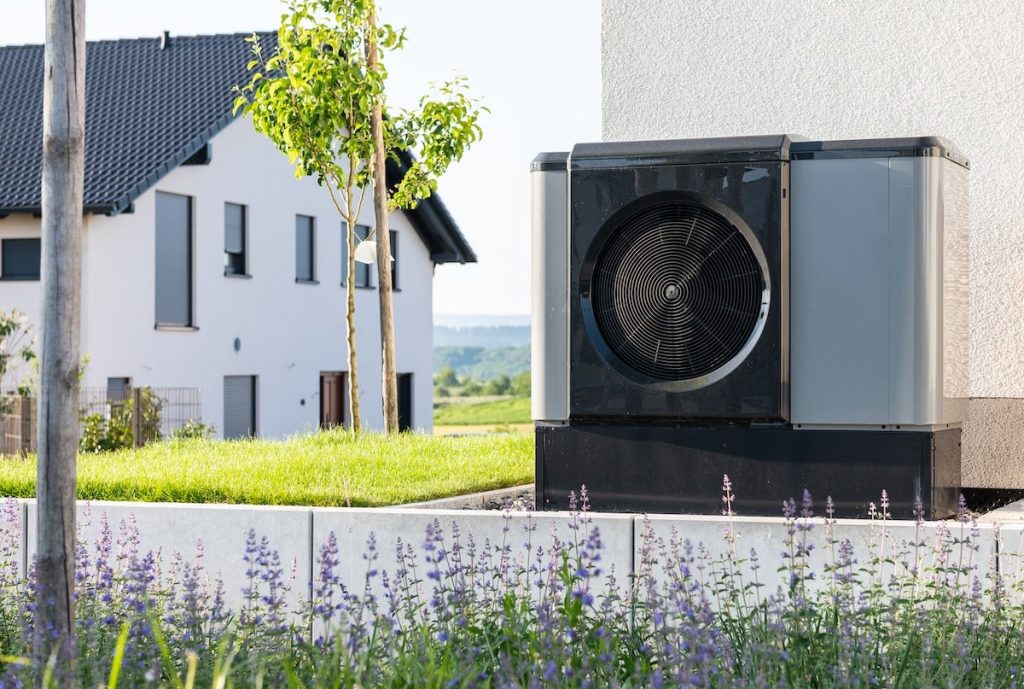Heat Pumps Are Twice as Efficient as Oil and Gas Heating in Cold Weather, Study Says
3 min read
A heat pump in the garden of a single-family house in Baden-Württemberg, Rottweil, Germany. Silas Stein / picture alliance via Getty Images
Founded in 2005 as an Ohio-based environmental newspaper, EcoWatch is a digital platform dedicated to publishing quality, science-based content on environmental issues, causes, and solutions.
A new study from Oxford University and Regulatory Assistance Project, an NGO, found that even in cold weather, heat pumps are twice as efficient as heating from fossil fuel sources.
Although heat pumps have been identified as an important way to transition to cleaner energy sources, there have been concerns over whether the pumps would perform adequately in lower temperatures.
Research published in the journal Joule finds that not only are heat pumps capable of operating efficiently in colder weather, but they can even outperform other heating sources, like oil, gas or electric resistive heating.
Ground-source heat pumps can be particularly efficient in cold weather, because there aren’t big changes in soil temperatures between seasons, the study authors explained. Further, the authors noted that ground-source heat pumps don’t need to use any energy to defrost, also boosting their efficiency in cold weather.
To reach these findings, the researchers evaluated the performance data from seven different field studies in mild cold climates, or areas with average temperatures above -10 degrees Celsius (14 degrees Fahrenheit) for January. The studied regions include Switzerland, Germany, the UK, Canada, China, and two field studies in the U.S. They found that the efficiency of heat pumps in mild cold climates when temperatures were between -10 and 5 degrees Celsius was much higher than heating from both fossil fuel sources and electric resistance heat sources.
The team also studied cold-climate heat pump performance in areas with extreme cold climates, or average January temperatures below -10 degrees Celsius. In this review, they found that cold-climate air-source heat pumps produced a coefficient of performance (COP) of over 1.5 at temperatures as cold as -30 degrees Celsius (-22 degrees Fahrenheit). However, the authors noted that while there are heat pumps designed specifically for colder climates, these systems aren’t the best option everywhere. They may perform less efficiently when temperatures are mild.
Ultimately, the study found that heat pumps were performing two to three times more efficiently than combustion heating or electric resistance heating. The authors noted that the findings largely suggest that heat pumps do not require a backup heating source, like a fossil fuel powered heating source, but more studies are needed to consider the value of hybrid heating systems.
Because heat pumps can cost more up front than other heating elements, consumers may be hesitant to install them. This has prompted some governments to consider incentives to transition more households to heat pump systems. For instance, the UK is considering incentive proposals to encourage more people to make the switch and is also requiring a heat pump sales quota for heating companies, The Guardian reported.
The new research could help ease concerns around the world over the effectiveness of heat pumps, particularly in below-freezing temperatures.
“Our view is that the widespread rollout of air-source heat pumps around the world as part of decarbonization efforts can be successful with existing technology in most areas that have space heating demand,” the authors concluded. “Ground-source heat pumps and hybrid air-source systems may have significant value in the coldest climates.”
Subscribe to get exclusive updates in our daily newsletter!
By signing up, you agree to the Terms of Use and Privacy Policy & to receive electronic communications from EcoWatch Media Group, which may include marketing promotions, advertisements and sponsored content.





